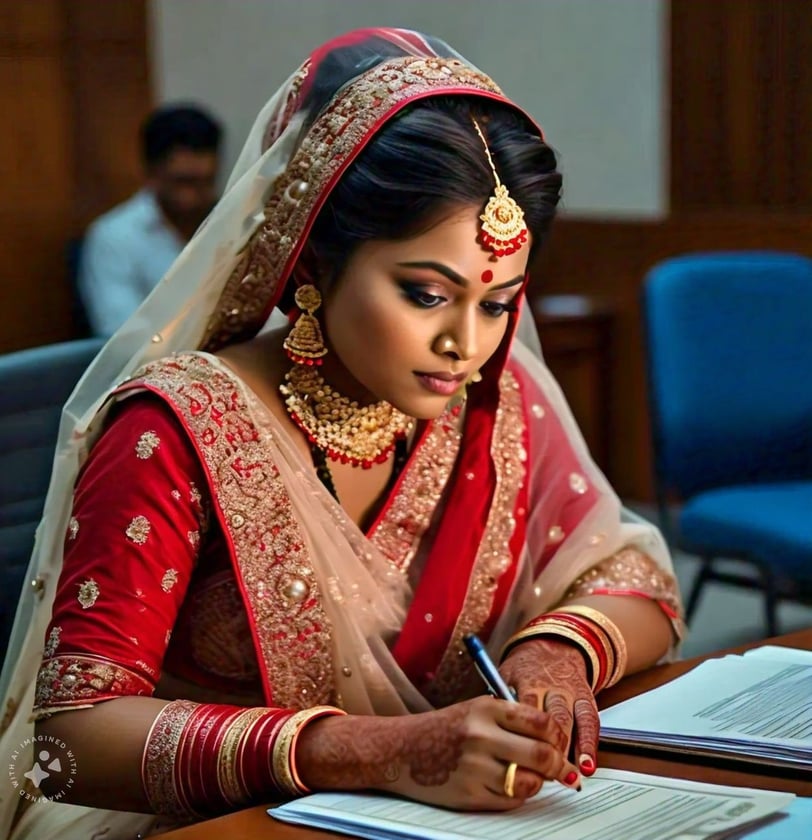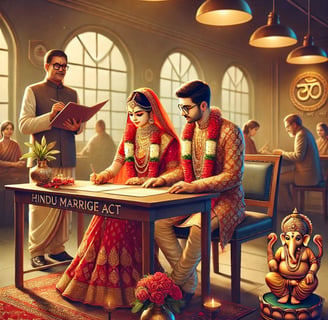"Daftese Consulting Private Limited"
Marriages Registration
Marriages Registration Process
LEGAL DOCUMENTATION FOR INDIVIDUAL, ORGANISATION, NGO, REAL ESTATE COMPANY, BANK, FINANCIAL INSTITUTION, MORTGAGE COMPANY.
Tonmoy Purkayastha, Advocate
10/31/20245 min read


Marriages Registration
Marriage registration is the legal process by which a marriage is officially recorded with the relevant government authority. It provides legal proof of the marriage and is required for many legal and administrative processes, including obtaining spousal benefits, inheritance rights, and resolving disputes.
1. Importance of Marriage Registration:
Legal Recognition: A registered marriage has legal standing, and the marriage certificate acts as proof of the union.
Spousal Benefits: It enables couples to claim spousal benefits such as insurance, social security, and inheritance.
Immigration and Visa: A marriage certificate is essential for immigration purposes, such as applying for a spouse visa.
Property Rights: Registration can establish property and inheritance rights between spouses.
2. Laws Governing Marriage Registration in India:
In India, marriage registration can be done under two primary laws:
Hindu Marriage Act, 1955: Applies to Hindus, Buddhists, Jains, and Sikhs. Registration is optional but encouraged for legal purposes.
Special Marriage Act, 1954: Applies to all citizens of India, regardless of religion. It is primarily used for interfaith marriages or when neither party is religious. This act requires compulsory registration and provides a secular method for solemnizing and registering marriages.
Other religious groups, such as Muslims and Christians, have their respective laws (e.g., Christian Marriage Act, Muslim Personal Law) but can also opt for registration under the Special Marriage Act.
3. Eligibility Criteria for Marriage Registration:
Age: The groom must be at least 21 years old, and the bride must be at least 18 years old.
Consent: Both parties must freely consent to the marriage. Coerced marriages are not valid.
Single Status: Neither party should have a living spouse at the time of marriage (unless permitted under personal laws, such as in Muslim law).
Prohibited Relationships: The parties must not be within the degrees of prohibited relationships (such as close blood relatives), unless the custom of the community permits it.
4. Documents Required for Marriage Registration:
The documents required for marriage registration typically include:
Proof of Age: Birth certificate, school leaving certificate, or passport for both parties.
Address Proof: Voter ID, Aadhaar card, utility bills, or passport for both parties.
Photographs: Passport-sized photographs of the bride and groom.
Marriage Invitation Card: A copy of the wedding invitation card (optional in some states but useful as supporting evidence).
Marriage Proof: An affidavit stating the date, place, and time of the marriage along with photographs of the wedding ceremony (for Hindu Marriage Act).
Witnesses: Three witnesses for the Special Marriage Act and at least two for the Hindu Marriage Act (who should have attended the wedding and are required to sign the documents).
Affidavits: Signed affidavits stating that both parties are of eligible age, not married to anyone else, and have given their free consent to the marriage.
5. Procedure for Marriage Registration:
A. Under the Hindu Marriage Act, 1955:
Step 1: Apply for Registration: The couple must approach the Registrar of Marriages in the jurisdiction where either party has been residing for at least 30 days prior to the application.
Step 2: Submit Documents: Submit all required documents such as proof of identity, address, age, and photographs, along with a copy of the marriage invitation or photographs of the wedding ceremony.
Step 3: Verification: The documents are verified, and the registrar may require both parties and their witnesses to appear in person.
Step 4: Issue of Marriage Certificate: Once the documents are verified and found valid, the registrar issues the marriage certificate, which is legal proof of marriage.


B. Under the Special Marriage Act, 1954:
Step 1: Notice of Intended Marriage: The couple must file a notice of their intended marriage at the marriage registrar's office in the area where either party has resided for at least 30 days. The notice is publicly displayed for 30 days.
Step 2: Objections (if any): During the 30-day period, anyone can raise objections to the marriage. If no valid objections are raised, the marriage can proceed.
Step 3: Marriage Ceremony: After the 30-day notice period, the marriage can be solemnized in the presence of the marriage officer and three witnesses.
Step 4: Registration: The marriage is registered immediately after the ceremony, and the marriage certificate is issued.
6. Documents Required Under Special Marriage Act:
Notice of Intended Marriage: Form filled and signed by both parties.
Proof of Age and Address: As per the documents listed earlier.
Affidavit: Declaration by both parties that they are unmarried, of legal age, and not related within prohibited degrees of relationship.
Witnesses: Three witnesses are required to be present at the time of solemnization and registration.
7. Marriage Registration for NRIs or Foreigners:
For Indian citizens marrying abroad or foreigners marrying in India, registration can be done under the Foreign Marriage Act, 1969. The marriage officer in the Indian consulate or embassy can register the marriage.
Foreigners marrying Indian citizens in India can register their marriage under the Special Marriage Act, 1954.
8. Benefits of Marriage Registration:
Legal Recognition: Marriage registration provides legal recognition, ensuring that both parties are legally married.
Ease of Legal Processes: The marriage certificate simplifies legal proceedings, such as divorce, alimony, inheritance, or immigration applications.
Spousal Rights: Registered marriages protect spousal rights, including the right to inherit property and claim insurance, pension, and other benefits.
Social Security: Many social security benefits (pension, medical claims, insurance, etc.) are provided only to the legally recognized spouse, making registration essential.
9. Online Marriage Registration:
Many states in India offer online marriage registration services where couples can apply for registration through the official government website. The documents can be uploaded online, and an appointment is scheduled for document verification and in-person appearances.
Online registration speeds up the process and reduces the need for multiple visits to government offices.
10. Time and Fees for Marriage Registration:
Processing Time: Under the Hindu Marriage Act, registration is usually completed within a few days to a week after the submission of documents. Under the Special Marriage Act, it takes at least 30 days due to the mandatory notice period.
Fees: Registration fees vary from state to state, but they are generally nominal, ranging from ₹500 to ₹1000 (approximately). Under the Special Marriage Act, the fees may be slightly higher due to the extended procedure.
11. Legal Implications of Non-Registration:
In India, while marriages conducted under religious ceremonies (like Hindu or Muslim marriages) are legally recognized even without registration, failure to register can create legal complications in the future, especially for inheritance, divorce, or claiming spousal rights.
The Supreme Court of India has also recommended the compulsory registration of all marriages to prevent fraud, bigamy, and child marriages.
Summary:
Marriage registration provides legal protection, making the marriage legally enforceable and recognized. It is a simple process involving the submission of documents, verification, and issuance of a marriage certificate under either the Hindu Marriage Act or the Special Marriage Act, depending on the circumstances of the couple.
If you want consult about your marriage registration than free to contact with us at whatup 9365048360


